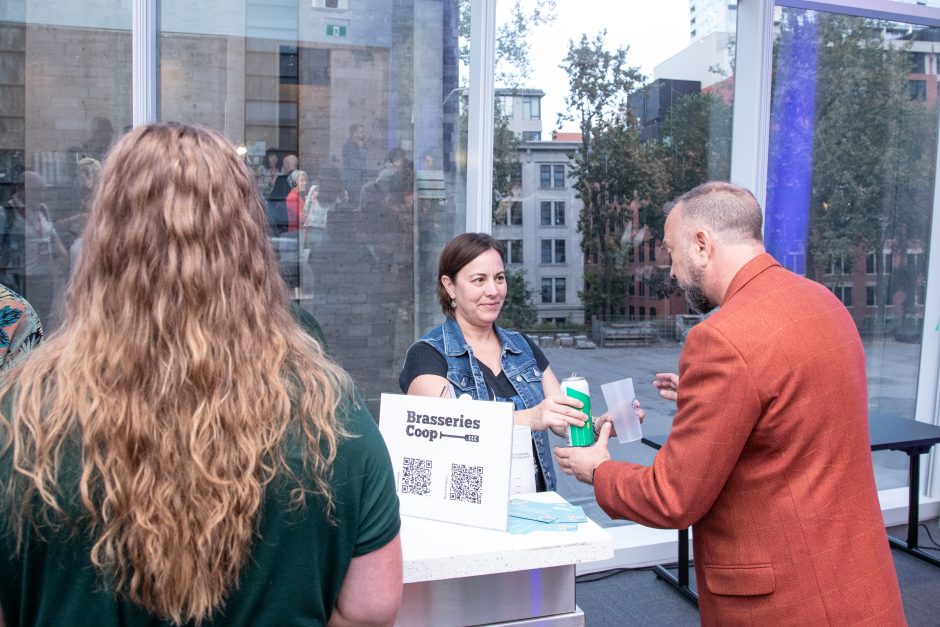In September over 350 delegates from around the world met in Montreal, Canada, for the Global Innovation Coop Summit (GICS). Co-hosted by the Institut international des coopératives Alphonse-et-Dorimène-Desjardins (Alphonse and Dorimène Desjardins International Institute for Cooperatives), the summit aimed to be an eco-friendly event.
Sustainability is a key area of work for the institute, a research unit of the university HEC Montréal that supports the co-operative movement with digital data. As such, the team behind the event explored ways to lower its environmental impact and promote alternatives.
“If there’s a will, there’s a way,” says Marie-Josée Lapointe, administrative director of the institute. She adds that inter-co-operation is not that difficult but it requires good organising and coordination.
While the institute has hosted other events in the past, this was the first time it was involved in organising something of this scale. What made a difference was not only having a co-op ecosystem such as in Montreal, but also being able to count on a group of volunteers from HECOresponsable, a student committee whose mission is to promote the principles of sustainable development and alternative business practices among graduate students.
Being involved in such an event helped students become more interested in the subject of sustainability, says Eleonore Compère, project coordinator at the institute. She adds that the team of volunteers was able to see how simple choices can make a difference. These included re-used lanyards from previous events; the elimination of the event bag; the use of recycled paper for printing; and the distribution of food surpluses to the HEC Montréal community and a shelter.

To make it a success, the institute’s team, along with that of the GICS, worked with a range of local co-ops, including Retournzy co-op for the use of reusable containers, glasses and cutlery, Table des Microbrasseries COOP to offer beers from Quebec microbrewery co-operatives and Coop Carbone to enable delegates to offset their CO2 emissions if they wished to do so.
One of the initiatives implemented was offering vegetarian lunch boxes, provided by Coop HEC Montréal, the university’s co-op, which the institute says eliminated one ton of CO2 emissions. Instead of offering water bottles, the institute used water pitchers that were filled with tap water. Water and juice dispensers and milk jugs completely eliminated the need for single-use plastics.
“In total, Retournzy provided 6,030 reusable items over the two and a half days of the event: 3,530 glasses, 730 utensil kits (spoon, knife and fork) and 310 teaspoons,” says Cindy Vaucher, one of the co-founding members of Retournzy.
“The items were delivered to the Coop HEC Montréal’s catering service at the start of the event and collected at the end of the event using our cargo bike and our electric car. We washed and sanitised the items after their use in our washing centre located in the Villeray district of Montreal. This great experience of collaboration not only with the institute but also with the Coop HEC Montréal made it possible to have a major impact on the reduction of waste during this event. The efforts put in place for eco-responsibility were more than appreciated by the participants.”
The idea for Retournzy was born in the middle of the pandemic, when a group of citizens and catering professionals decided they wanted to help minimise plastic waste associated with takeaway orders.
“With Retournzy being a transition project, we are convinced that it will only work if individuals, businesses and the public sphere collaborate together,” adds Vaucher. “A collective business structure seemed obvious to us to actively involve all these players in change, to try to resolve a collective problem: the overproduction of waste.
“Since the co-operative workers and support members are also owners, everyone is listened to and participates in the co-creation of our service. Instead of moving forward alone, we move forward together. We have also chosen to be a co-operative with a non-profit tax status so that the partners involved are there with an impact perspective and not just for lucrative reasons. Of course, a co-operative seeks profit, but not profit maximisation at any price. Our surpluses, if they exist, will be systematically reinvested in our environmental and social mission.”
Retournzy collaborates with other co-ops, including Coop Carbone, which supports its sustainable mobility strategy (cargo bike) and Table des Microbrasseries COOP, which used Retournzy reusable glasses to serve their beers. These co-ops were also involved in the summit, supporting sustainability efforts. Table Microbrasseries COOP enabled participants to sample local beers from co-ops.

“The Table des Microbrasseries COOP provided the selection of beers in collaboration with the hosts and the catering service – and is also constituted as a co-operative,” says Anne Claude Thivierge, project manager, Réseau COOP. “They co-ordinated the delivery and contributed to the serving of the beers chosen during the GICS opening cocktail event. Three of the four microbreweries highlighted had a representative on site: these are À la Fût in Mauricie, and des Grands Bois in the county of Portneuf from La Barberie, from Quebec, and Pie Braque from Saguenay.
“The Table des Microbrasseries COOP is an initiative of Réseau COOP which specialises in supporting worker co-operatives. Since May 2023, a shared resource has been developing co-op spaces to publicise the co-op identity of member microbreweries and encourage co-operatives and social economy partners to order co-op beer during their events.”
Having other co-ops involved in the project made collaboration easier, according to Lapointe.
“It’s easier when we work with people who want the same things and share the same values. The co-op model makes it easier to choose this route,” she says.
Delegates also had the option to offset their travel emissions by working with Coop Carbone, a local carbon off-setting co-op in Montreal. CEO Jean Nolet, who took part in a panel discussion at the conference says there was a lot of interest in the audience in his co-op’s work.
Coop Carbone supports the implementation of collaborative projects to reduce greenhouse gas emissions. Its clients include financial co-op Desjardins Group and agricultural co-ops Sollio Group and Agropur. When setting up Coop Carbone, the founding members chose the co-operative model with the aim of bringing various groups who share similar values on board.
“It’s a question of values,” says Nolet. “It was important to choose this model because we believe that if the climate change battle is to be a success, we need to bring together different people and organisations to collaborate on a joint objective. The co-op movement favours the collaboration of organisations so it was a key issue of the approach we promote.”
Participants were also able to calculate their GHG emissions with Coop Carbone’s calculator to offset the emissions they produced participating in the event.
Their stall received many visitors during the event and they were able to offset two tonnes associated with the delegates’ travel to the conference.
“Our institute co-hosted the event, and this is why we had the opportunity to use the event as leverage to advance inter co-operation – one of the three themes of the conferences – also in practical terms,” concludes Rafael Ziegler, associate professor, Department of Management and director of the Institut international des coopératives Alphonse-et-Dorimène-Desjardins (Alphonse and Dorimène Desjardins International Institute for Co-operatives).